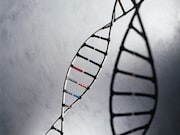Field could advance more quickly if data from research participants, consumers got to clinic
TUESDAY, July 31, 2018 (HealthDay News) — Introduction of genomic screening (GS) into routine health care is dependent on demonstration of clinical utility, which will be quicker with use of more data, according to an Ideas and Opinions piece published online July 31 in the Annals of Internal Medicine.
Michael F. Murray, M.D., from the Yale School of Medicine in New Haven, Conn., discusses the potential use of routine GS in health care.
Murray notes that in order to speed understanding of the clinical utility of GS, it is in everyone’s interest to use valid data from as many people as possible. Millions of people have undergone DNA analysis worldwide — as patients, as research participants, and as consumers. It is likely that GS data generation will remain slow in patient care pending insurer coverage or public funding. If existing data from research participants and consumers could find their way to the clinic, the field could advance more quickly. For more than a decade, GS data generated in the consumer arena have been moving into clinical care, but models for implementation into health care are lacking. When companies offer GS outside of health care, they should be expected to demonstrate a successful hand-off model for data.
“Individually tailored health care management plans based on DNA analysis are coming, but the timing of their introduction into routine clinical care is contingent on further demonstrations of clinical utility and proven implementation models,” Murray writes.
Copyright © 2018 HealthDay. All rights reserved.








